- Palo Verde College is a California community college that provides an exemplary learning environment with high quality educational programs and services. It promotes student success, lifelong learning and community development. Our goal is to create better futures for our students and our communities.
School Highlights
Palo Verde College serves 6,354 students (10% of students are full-time).
The college's student:teacher ratio of 49:1 is higher than the state community college average of 32:1.
Minority enrollment is 65% of the student body (majority Hispanic), which is less than the state average of 77%.
Quick Stats (2025)
- Enrollment: 6,354 students
- In-state tuition: $1,288
- Out-state tuition: $7,364
- Student:teacher ratio: 49:1
- Minority enrollment: 65%
- Source: Integrated Postsecondary Education Data System (IPEDS)
School Overview
The teacher population of 131 teachers has stayed relatively flat over five years.
Palo Verde College
(CA) Community College Avg.
Carnegie Classification
Associate's Colleges: High Transfer-Mixed Traditional/Nontraditional
Baccalaureate/Associate's Colleges: Associate's Dominant
Institution Level
At least 2 but less than 4 years
At least 2 but less than 4 years
Institution Control
Public
Public
Total Faculty
131 staff
294 staff
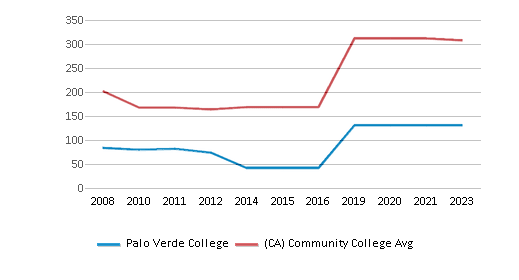
School Calendar
Student Body
The student population of Palo Verde College has grown by 39% over five years.
The student:teacher ratio of 49:1 has increased from 29:1 over five years.
The Palo Verde College diversity score of 0.68 is less than the state average of 0.70. The school's diversity has stayed relatively flat over five years.
Total Enrollment
6,354 students
2,311 students
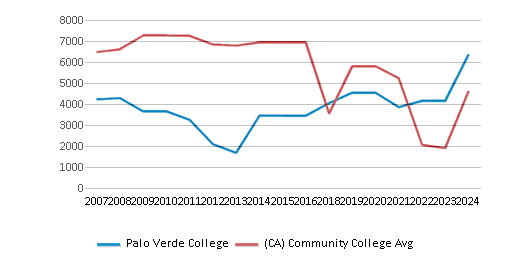
Student : Teacher Ratio
49:1
32:1
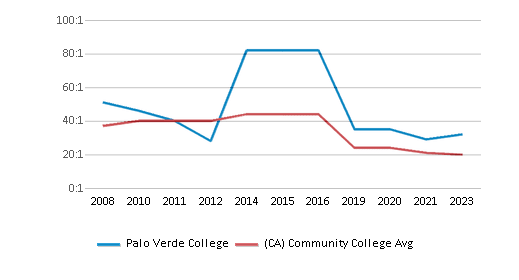
# Full-Time Students
661 students
1,232 students
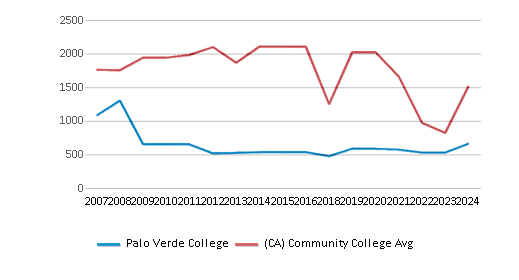
# Part-Time Students
5,693 students
8,299 students
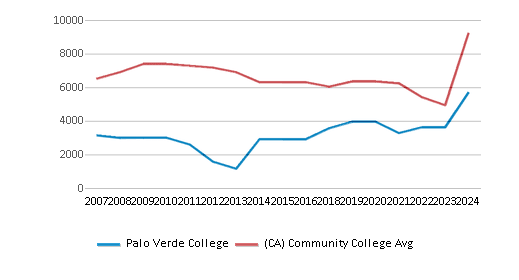
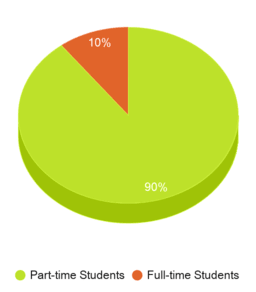
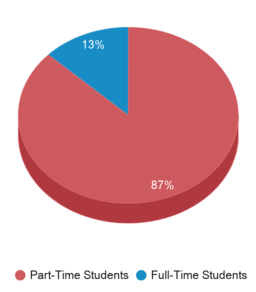
# Enrollment Undergraduate
635 students
240 students
# Full-Time Undergraduate Students
661 students
1,155 students
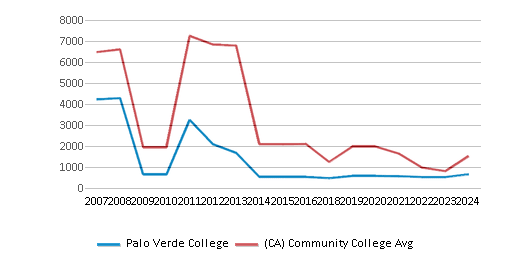
# Full-Time Graduate Students
n/a
63 students
# Part-Time Undergraduate Students
5,693 students
8,457 students
# Part-Time Graduate Students
n/a
10 students
Total Dormitory Capacity
n/a
140 students
% American Indian/Alaskan
1%
n/a
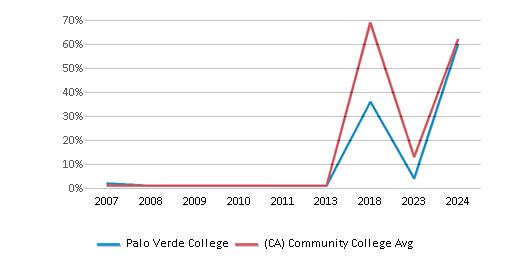
% Asian
3%
13%
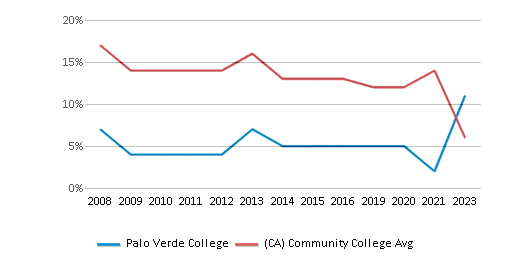
% Hispanic
43%
47%
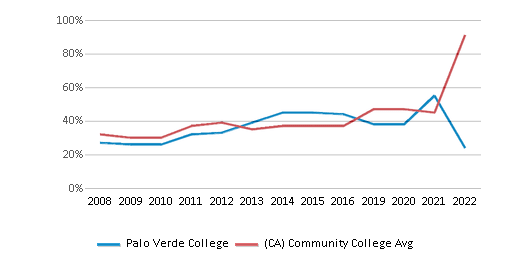
% Black
10%
7%
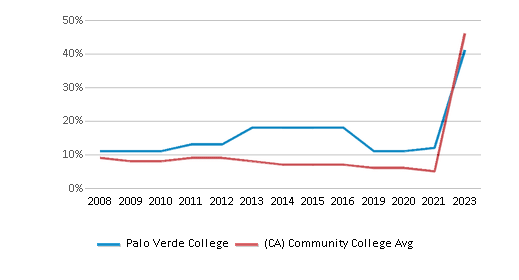
% White
35%
23%
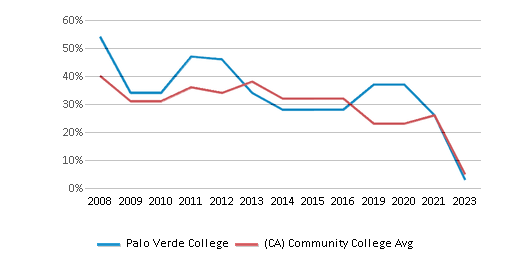
% Hawaiian
1%
1%
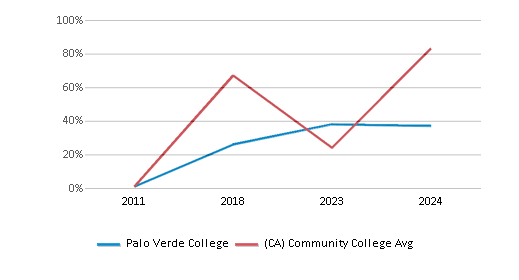
% Two or more races
3%
5%
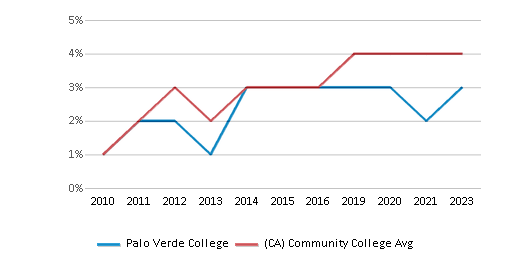
% Non Resident races
n/a
1%
% Unknown races
4%
3%
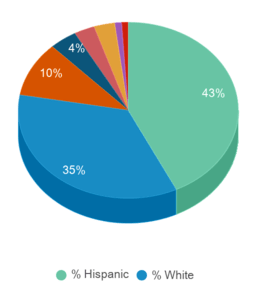
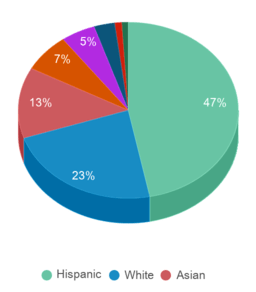
Diversity Score
0.68
0.70
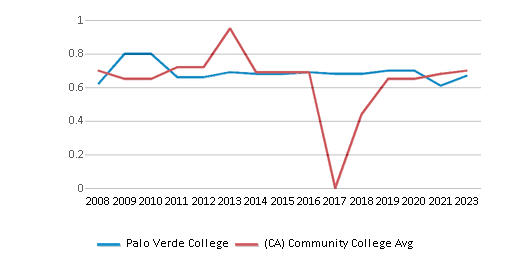
College Completion Rate (Students who graduate in less than 4 years)
0.3%
0.4221%
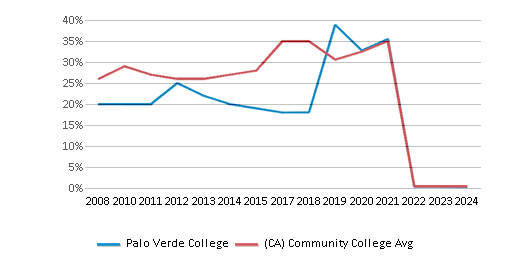
College Completion Rate (Students who graduate in 4 years or more than 4 years)
n/a
0.4304%
Average Graduate Earnings (10 Years)
$29,900
$34,700
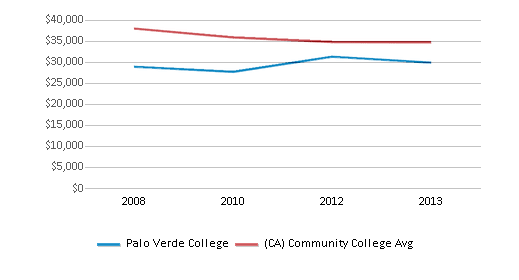
Tuition and Acceptance Rate
The public in-state tuition of $1,288 is more than the state average of $1,236. The in-state tuition has stayed relatively flat over four years.
The public out-state tuition of $7,364 is more than the state average of $6,547. The out-state tuition has declined by 21% over four years.
In-State Tuition Fees
$1,288
$1,236
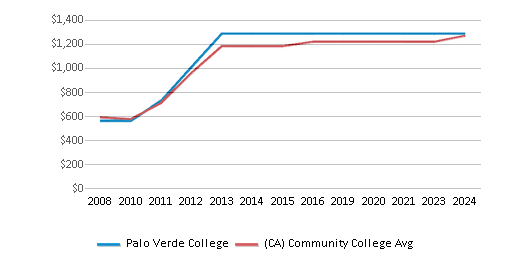
Out-State Tuition Fees
$7,364
$6,547
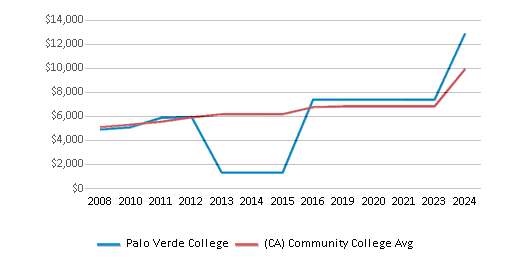
% Students Receiving Some Financial Aid
83%
85%
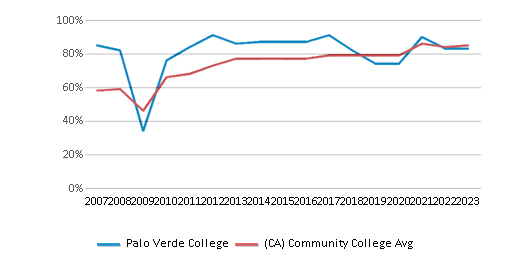
Median Debt for Graduates
n/a
$10,500
Median Debt for Dropouts
n/a
$6,239
Acceptance Rate
n/a
92%
Source: 2024 (or latest year available) Integrated Postsecondary Education Data System (IPEDS)
School Notes
- Palo Verde College is one of California's smaller community colleges. Students at Palo Verde College have all the advantages of a comprehensive community college and of a small college that is able to provide its students with personalized services. Palo Verde College is located along the Colorado River in the fertile Palo Verde Valley, 165 miles west ofPhoenix, 110 miles east of Palm Springs, and 100 miles north of Yuma. Its service area includes approximately 20,556 people, 12,456 of whom reside in Blythe.The charm of Southern California agricultural life permeates the valley. Tourism is a major industry,boosted by temperate winters and summers built around river water sports. Palo Verde College is dedicated to learning, to reflection, to personal growth. People of all ages and backgrounds attend from early morning to late evening and weekends to take advantage of a wide varietyof course offerings. The College has a reputation for quality and a readiness to respond quickly and appropriately to all community educational needs. The college was founded on September 15, 1947, six miles northwest of Blythe on the site of the former Morton Air Academy. Palo Verde College opened its doors as a junior college within the Palo Verde Unified School District. Seventeen students enrolled. By 1950, enrollment had reached 250. In September 1958, the College moved into a beautiful Spanish styled building on East Hobsonway. Athletics came into prominence. The Pirates won three conference championships in football and three in baseball. By 1966, the student body numbered 472. Palo Verde College moved to the Chanslorway campus in September, 1967. On July 1, 1973, the College separated from the Unified School District. The instructional program expanded to include vocational/technical, developmental, and continuing education courses. In August, 2001 the college began classes on its new, 200-acre campus. By Spring 2003, more than 2,000 students were enrolled in classes. Students attend Palo Verde College in preparation for transfer to a four-year institution, to acquire entry level job skills, or to increase their vocational competency for personal enrichment. Palo Verde College is pleased with the prestige its faculty and graduates have received. The continued success of the College depends upon superior teaching, and faculty members are selected with this in mind. Palo Verde College is a Public Community College Accredited by the Accrediting Commission for Community and Junior Colleges, The Western Association of Schools and Colleges.
Frequently Asked Questions
How much does Palo Verde College cost?
Palo Verde College's tuition is approximately $1,288 for In-State students and $7,364 for Out-State students.
Recent Articles

Obtaining Your Bachelor's Degree at a Community College
Explore the evolving landscape of community colleges offering bachelor's degrees, addressing affordability, accessibility, and workforce needs.

A to Z of Community College Certificates and Courses
From business and healthcare to technology and skilled trades, the article showcases the breadth of options available to students seeking to enhance their knowledge, develop new skills, or pursue career advancement.

What is a Community College?
This comprehensive guide explains what a community college is, its history, and its role in higher education. It covers the types of programs offered, differences from four-year colleges, benefits of attending, and important considerations for prospective students, providing valuable insights for those exploring educational options.









